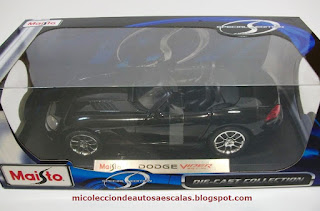Este es un blog de fotografías para la colección personal de autos de diferentes escalas.
Monday, June 14, 2010
1966 Lincoln Continental Custom Maisto 1:26
Monday, June 7, 2010
1932 Ford Delivery Hot Rod Flames Hot Wheels 1:64 2008 All Stars
De 1932 Ford Delivery Hot Wheels escala 1:64 edición 2008 All Stars.
The '32 Ford Delivery is based on designer Larry Wood's own car. Full-fendered with a V8 engine, this sedan was made to deliver in both speed and style.
Friday, May 28, 2010
2003 Dodge Viper SRT-10 Maisto 1:18
The Dodge Viper is a sports car that was manufactured by Dodge (by SRT for 2013 and 2014), a division of American car manufacturer FCA US LLC from 1992 through 2017, having taken a brief hiatus in 2007 and from 2010 to 2012. Production of the two-seat super car began at New Mack Assembly Plant in 1991 and moved to Conner Avenue Assembly Plant in October 1995.
Although Chrysler considered ending production because of serious financial problems, on September 14, 2010, the then chief executive Sergio Marchionne announced and previewed a new model of the Viper for 2012. In 2014, the Viper was named number 10 on the "Most American Cars" list, meaning 75% or more of its parts are manufactured in the U.S.
The Viper was eventually discontinued in 2017 after being in production for just over twenty years.
Friday, May 21, 2010
1982 DeLorean DMC-12 Time Machine Movie 1 WELLY 1:24
El DeLorean DMC-12 es un automóvil deportivo fabricado por DeLorean Motor Company (DMC) entre 1981 y 1982. Es conocido como el DeLorean, ya que este fue el único modelo que fabricó dicha compañía. El DMC-12 se caracteriza por sus puertas de ala de gaviota y su carrocería metálica de acero inoxidable sin pintura. Es muy conocido por su aparición en la trilogía de películas de Back to the Future. Después de aparecer en estas tres películas, el DMC-12 se convirtió en un objeto de culto.
El primer prototipo apareció en octubre de 1976 y la producción empezó oficialmente en 1981 en la fábrica que DMC tenía en Dunmurry, en Irlanda del Norte. Durante su producción se cambiaron varios aspectos del automóvil, como el estilo del capó, las ruedas y el interior.
Al menos 8500 DMC-12 fueron fabricados antes de que la producción finalizase en 1982. En 2007 se estimaba que aún existían 6500 de ellos.
Friday, May 14, 2010
1992 Chevrolet Lumina Nascar Racing Champions Ricky Craven 1:24
Richard Allen Craven (born May 24, 1966) is an American stock car racing analyst and former driver. Prior to his broadcasting duties, he was a NASCAR driver who won in four different series—the K&N Pro Series, and the three national series.
He occasionally served as a pit reporter when NASCAR aired on TBS in the mid-1990s. Craven is perhaps most well known for winning the 2003 Carolina Dodge Dealers 400, beating Kurt Busch in the closest finish in Cup Series history.
Craven began racing at the age of 15 at Unity Raceway, winning twice as well as the Rookie of the Year award. The next year, he won 12 feature events and the track championship. In 1984 Craven raced at Wiscasset Speedway in the Late Model Division; in this year he won the track championship along with the Rookie of the Year title. After that, he began running in the American Canadian Tour, where he had rampant success. In 1986, he made his NASCAR debut at Oxford Plains Speedway in his own No. 12, finishing 25th after suffering engine failure. Four years later, he began running the Busch North Series, winning the Rookie of the Year award. In 1991, he was named the champion in that series, winning ten times in the No. 25 Chevrolet, with two of those ten wins in "combination" races with the Busch Grand National Series, including the prestigious Oxford 250. In addition, he made his Winston Cup debut at Rockingham, starting and finishing 34th for Dick Moroso. He moved to the Busch Series full-time in 1992 in the No. 99 Chevy for Bill Papke, and once again was named Rookie of the Year. In 1993 and 1994, he finished runner-up to Steve Grissom and David Green, respectively, in the championship standings. On October 9, 1994, Craven would serve as a pit reporter for TBS's broadcast of that year's Mello Yello 500, serving as a precursor to his broadcasting career.



















































